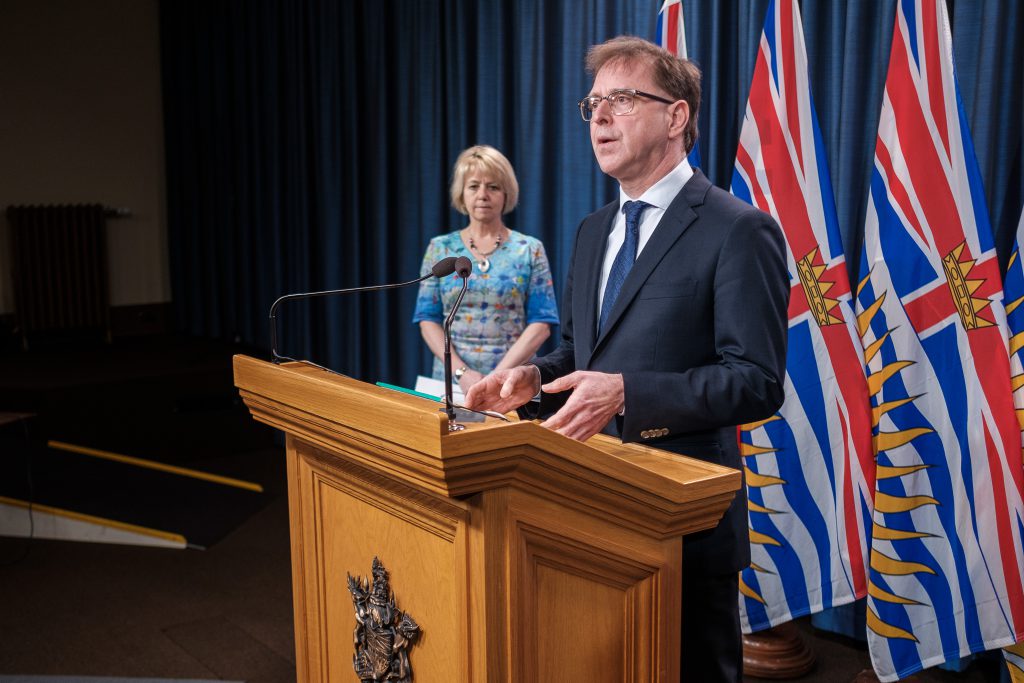
B.C. health officials say there have been 29 new confirmed cases of COVID-19, plus one epidemiologically-linked case, since Friday.
From Friday to Saturday, there were 14 confirmed COVID-19 cases. From Saturday to Sunday, there were six cases, and from Sunday to Monday, there were nine cases. The majority of new cases are in Fraser Health.
Dr. Bonnie Henry, provincial health officer, said those cases are all linked to known outbreaks, including one of the long-term care facilities and a cluster with a family gathering.
“Things can be transmitted and those chains can go on for some time if we’re not careful,” Henry said.
No new deaths from COVID-19 were reported over the last three days. The death toll remains at 167.
None of the new cases are in Island Health, which remains at a total of 130 cases since the pandemic began. Of those, 125 have recovered and there have been five deaths.
Elsewhere in B.C., there have been 907 cases in Vancouver Coastal Health (a decrease due to data correction), 1,362 in Fraser Health, 195 in Interior Health and 64 in Northern Health.
To date, B.C. has seen a total of 2,659 confirmed cases of the virus.
There are currently 183 active cases of COVID-19 in B.C. Sixteen people are in hospital with the virus, including four in intensive care.
There are four active outbreaks in long-term care homes, while community outbreaks at Fraser Valley Specialty Poultry and Superior Poultry have been declared over.
Starting June 15, BC Ferries says all passengers over the age of two will be asked to confirm they have a face covering and are willing to wear it if necessary.
It says in a news release that customers must come with their own face covering and those who don’t have one won’t be able to board.
The company says it will also continue screening customers for COVID-19 symptoms.
BC Ferries says it is acting on directives from Transport Canada that require passengers to wear a mask when a physical separation of two metres can’t be maintained.
Henry said Monday she has no intention of issuing an order to wear masks.
Protesters against racism in B.C. have been seen wearing masks. Henry said Monday protesters have a right to peaceful demonstrations but there can be impacts on vulnerable populations, such as Indigenous communities.
She said she recommends people obey the health orders in place and look at gathering in smaller groups, wearing masks and maintaining physical distances.
“We do not want to outbreaks seeded because of these very important ways of having our voices heard,” Henry said.
She said protesters who have been large groups need to monitor themselves for symptoms, especially if there was lots of shouting and people were close together. Anyone with symptoms can get tested in B.C.
The company just recently restarted some services after customer use declined by about 80 per cent from March to May.
And Canada’s ban on non-essential crossings of the U.S.-Canada border is being loosened slightly to allow some families to reunite, Prime Minister Justin Trudeau announced Monday morning.
The revision means immediate family members of Canadian citizens or permanent residents will be allowed in, as long as they have no sign they might have COVID-19 and no reason to believe they might have caught it.
The border restrictions still require anyone entering the country from the United States to self-isolate for two weeks to reduce the risk of spreading the novel coronavirus.
“If you don’t follow these rules, you could face serious penalties,” Trudeau warned.
The change applies at midnight Monday night in the Eastern time zone.
Immigration Minister Marco Mendicino called the change “very incremental,” targeted and focused on a small number of people.
Canadians always have a right to return to this country from abroad, but some families have been divided because of some of their members’ citizenship status.
The measure is aimed at families with unusual circumstances, such as when one parent is not a citizen.
The border with the United States has been closed since March, except for goods and certain categories of essential workers.
The current agreement with the United States expires June 21, but it has been extended twice already for a month at a time.
B.C. Health Minister Adrian Dix noted Monday there has been an increase in COVID-19 cases in Washington state, Oregon and California, saying B.C. will continue to work with the federal government on this.
He said he doesn’t see the border opening for general visitors anytime soon.
“I don’t see that as practical. I don’t see as practical either to have Canadians either visiting and then coming back,” Dix said.
“I don’t see it as practical for people visiting from the United States.”
To see a breakdown of B.C.’s COVID-19 numbers by day, visit the BC COVID-19 dashboard.
The number of confirmed COVID-19 cases globally is more than seven million, according to researchers with Johns Hopkins University and Medicine. The number of reported deaths is more than 405,000.
Watch Dr. Bonnie Henry and Minister Adrian Dix on June 8, 2020 below:
With files from The Canadian Press and CBC


